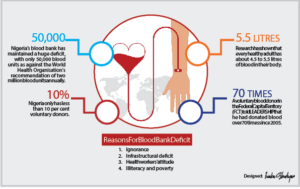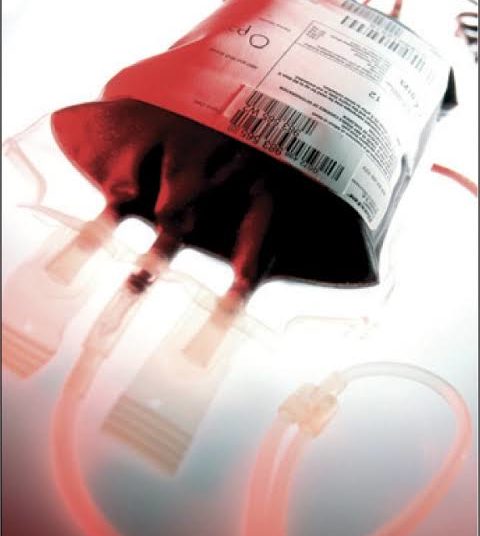Blood transfusion saves lives and improves health, yet many patients requiring transfusion in Nigeria do not have timely access to safe blood and blood products.
This is because the country’s blood bank has maintained a huge deficit, with only 50,000 blood units as against the World Health Organisation’s (WHO’s) recommendation of two million blood units annually.
LEADERSHIP learnt that availability of safe blood helps to reduce the mortality associated with life-threatening diseases, trauma cases from victims of road accidents, anaemia in children, bleeding in pregnancy and childbirths, thus the need for the country to have a strong base of voluntary unpaid donors in order to ensure that everyone who needs safe blood has access to it.
Also, WHO says that since blood can only be kept for a limited time, a steady supply of donations is important to make sure adequate blood and blood products are always available.
However, only a few Nigerians are willing to donate blood voluntarily and regularly as the country only has less than 10 per cent voluntary donors.
According to the Nigerian Medical Association (NMA), the country’s blood bank is marred with a low level of eligible adult blood donor population, adding that 10 per cent of HIV infection in the country is as a result of blood transfusion.

Apathy Of Knowledge And Awareness
Blaming the problem largely on apathy of knowledge and awareness, the president of the Nigerian Association of Resident Doctors (NARD), Dr. Emeka Orji, said Nigerians don’t behave like others from more developed countries where there is consciousness of donating blood in an attempt to help accident victims and even other victims of blood depletion who will need to be transfused.
“Some people will say why I should give someone else my blood; there is that lack of awareness on the side of the citizens,” he said.
Also, a senior registrar in neurosurgery at the National Hospital, Dr Ubong Essien, said there is a lot of ignorance; people feel that in the cause of donating blood, they might die or they might get infected by the needles that are going to be used. That, on its own, also affects the willingness of the populace to present themselves for blood donation. So there is poor knowledge about blood donation.
Infrastructural Deficit
On the side of the government, Dr. Emeka Orji told LEADERSHIP that the country has a deficit of infrastructure generally, including what is needed to establish a standard blood bank.
“I know that many hospitals who have blood bank, because of the regular power outage, may end up losing the blood because they are not able to preserve it accordingly in a manner and way needed. You will lose the blood you have in your bank and all these things have to do with power supply.
“So government should also try to invest more in health. When you invest more in health, of course the blood bank services will also benefit, and most of the time, we are talking about whole blood here but the practice has gone beyond whole blood; there are so many components you can get from blood, and the idea is to give the person exactly what the person needs – the component of the blood that he or she needs by separation using the machine that is meant for it,” he explained.
He lamented that the healthcare system in the country does not have that widespread availability of those things, saying this is also affecting blood donation because when you use the whole for a person, you end up wasting the other components, with all the effects that may be associated with it.
He said in most cases in the hospital, people get their relatives to donate blood for them, and if they are able to bring someone to donate, they will only pay for the cost of running the test.
“We encourage the government to also continue or even expand the campaign so that citizens will get to know the importance of blood donation and even the benefits. When this is done, this awareness will be there and you will see people going more for blood donation and you will end up having more,” he said.
In the same vein. Dr Ubong said access to facilities for donation and for storage are also part of the issues.
He said, “In order to store blood, you require so many things from a sterile bag to a refrigerator where you are storing this blood in a temperature of less than four per cent, to even anti-coagulants which are reagents that prevent blood from clotting.
“These reagents are also expensive to buy; you don’t just collect blood and you don’t have anywhere to store it. If you don’t store the blood, it will be wasted because the blood will undergo some metabolic processes; it will undergo denaturation and can’t be used for any patient, so absence of facilities for storage has also affected the reason why people cannot come out to donate blood.”
Health Workers’ Attitude
Identifying health worker’s attitude as part of the barriers to
voluntary blood donation, Ubong told LEADERSHIP that the problem that affects blood donation among the populace is multi-faceted, meaning there are a lot of factors that are responsible and one of them is the behaviour of health workers.
He said it is very hard to find a friendly health worker, starting from the nurses, to the doctors, porters and even hospital cleaners, adding that they are very rude to people.
Ubong said when you already have background experience, it is difficult for you to present yourself to the hospital where the blood donation will be taking because it is the same health workers that will be there to collect blood from you.
Myths
LEADERSHIP checks revealed that there are several myths impeding the country’s blood bank target. The most common is the belief that the blood donated for free is sold to needy patients. Some people think they don’t have enough blood while others are afraid of getting a disease through blood donation. Others say: “Women don’t donate blood”, “I just got my ears pierced”, “my blood will finish,” I can’t donate, I am on medication,” “I have tattoos”.
Collaborating this, the director-general of the National Blood Service Commission (NBSC), Dr Joseph Amedu, said there are several myths in different tribes and culture preventing people from donating blood, while calling on Nigerians to imbibe the culture of blood safety and availability in the blood bank.
Facts
Research has shown that every healthy adult has about 4.5 to 5.5 litres of blood in their body, and what is required from such a person is just about one pint of blood. And a pint of blood contains approximately 450mls of blood. So on average, a donor who gives just a pint loses only about one-tenth of his total blood volume.
In a similar way, the normal range of haemoglobin in a healthy male is about 13-17 g/dl and a healthy female has 11-15 g/dl. And a pint of blood reduces haemoglobin level only by 1g/dl. However, in a bid to ensure the availability of safe and adequate blood for Nigerians in need of it, the NBSC has inaugurated its National Central Planning Committee to strategise on ways to promote voluntary blood donation as a civic
responsibility and to ensure all blood establishments and hospitals work in synergy to provide sustainable quantities of safe blood and blood products for the country as well as adequately appreciating voluntary blood donors.
Demystifying some of the myths, Dr. Ubong explained that every individual can donate blood unless the person is less than 18 years or more than 65 years, while stating that women may not donate because of the monthly menstrual flow. Also, those who have just been recently transfused cannot donate blood as well as women who have had a minor surgery in the past six months because during surgery, they lose blood.
The physician further explained that sex workers and people who use intravenous drugs are exempted from donating blood as well as people who have HIV, hepatitis B and low blood level.
“Then cancer patients also. You know in blood donation, you can donate for yourself, you can also donate for someone. If you have a form of cancer, let’s say breast cancer, you are exempted from donating for yourself because if you donate and later the blood is transfused to you, the cancer can spread because the blood you are collecting might contain some cancer cells, so if it’s only in the breast, by the time we are transfusing you with the blood, it would have affected other parts of the body,’ he explained.
Explaining further, a consultant family Physician and country director of Planning, Research and Statistics at the National Blood Service Commission (NBSC), Dr. Adeze Oreh, said, “We keep talking about this myth around blood donation. From interacting with the public, we know that one to the things that seem as an impediment to them is that concept of selling blood but what we say to them is that to screen the blood, to make it safe, we can’t be talking about N50,000, so if it costs about N50,000 to prepare a unit of blood, you can’t compare it with the about N8,000 that you are asked to pay, so already it’s heavily subsidised.”
The physician told LEADERSHIP that screening of the blood is part of the process to make the blood safe, saying after collecting blood from a donor, the blood still needs to be kept in a refrigerator because if it is kept in an open place at room temperature, it will no longer be viable.
“Of course, you know in our environment, there are cost implications to maintain the blood in a refrigerating system, then you want to screen for HIV, Hepatitis B, C and syphilis. All those reagents used for these tests are imported. Unfortunately, we are not at a point where those reagents are produced here, so if we were complaining about the cost before, then you can imagine what the cost is now considering the foreign exchange and everything that is happening in our economy. So these are all the things that are done for every unit of blood before it can be given to a patient,” she added.
She, therefore, called on the government to support industries that can enable the production of these reagents locally because the commission still depends on imported reagents to test and screen blood.
On tattoos, she explained that, first of all, people get tattoos in different environments. “The process of getting a tattoo, if the place where the tattoo was given is not a hygienic place, it puts people at risk of hepatitis. So if somebody that has a tattoo comes to donate blood, the first question that will be asked by the counselor is how recent is the tattoo? So if it is a recent tattoo, we will do what we call temporary deferral to give them a period of time before they return to donate blood. That period of time is just to ensure that they did not get infected while getting the tattoo. We don’t want to put the person who wants to receive this blood at risk.”
Encouraging Voluntary Blood Donation
Speaking on encouraging voluntary blood donors, Oreh said for a lot of them, they want to be appreciated and for that reason, we are working with other organisations to see how we can support them.
“When you see things like maybe donor T-shirts, face caps and all the items that are given to donors, it is because we’ve collaborated with other organisations that maybe donated those items for that purpose.
“The other way for some of them, we present cards, certificates; things that they can use to say I was recognised. During the World Blood Donor Day, there will be ministerial recognition of maybe the highest donor. Two years ago, we even started with the recognition of female donors that have donated a lot of time. You know because of the difference between males and females, males will always donate more than females. We decided to create a category for females because if we use the same category for both men and women, the women will never meet up,” she explained.
Voluntary Blood Donors
A voluntary blood donor in the Federal Capital Territory (FCT), Nathan Akpan, told LEADERSHIP that he had donated blood over 70 times since 2005.
Akpan, who said he used to have a kind of partial headache when he started donating blood, stated that his system has gotten used to it now and that he feels fulfilled knowing he is saving lives through his blood.
“I am not paid but I feel fulfilled knowing that I am saving lives through my blood. I donate blood three to four times every year and it has become part of me,” he said.
Another resident of Abuja, Selim Umar, said he doesn’t donate blood because he feels that he doesn’t have so much blood to be giving out so that he doesn’t end up becoming enaemic.
“It will not make any sense if after donating blood, you will now be the one needing blood and looking for who to donate to you. I can
only donate if I have excess blood, but for now, my blood is just normal, I don’t want it to get less,” he said.
Health Benefits Of Donating Blood
There are advantages of blood donation which if the populace knew, they will be willing to donate, said Ubong.
According to him, donating blood renews the blood cells that circulate within the body system.
“The red blood cells survive for 90 to 100 days, so they are produced by the bone marrow and they live for about 120 days then they die off. But when you donate blood, you give room for the bone marrow to produce freshly from prepared more active cells that
are able to carry nutrients, oxygen and make the person healthier.
“So blood donation has its own physiological benefits which the public don’t know because if they do, we will have more people donating blood. Irrespective of the fact that the government doesn’t give incentives, people would want to voluntarily provide themselves to donate blood.”





